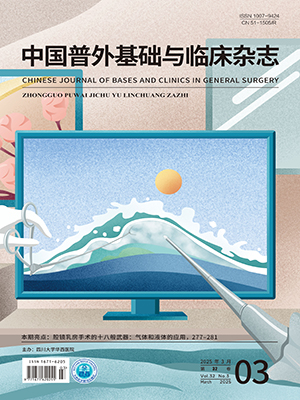| 1. |
汪晓东, 刘健博, 李立. 数据库建设第五部分: 结直肠癌的肿瘤特征—模块的设计(一). 中国普外基础与临床杂志, 2020, 27(3): 345-349.
|
| 2. |
汪晓东, 刘健博, 李立. 数据库建设第五部分·结直肠癌的肿瘤特征—模块的设计(二). 中国普外基础与临床杂志, 2020, 27(4): 483-488.
|
| 3. |
陶凯雄. 结肠癌新辅助治疗研究进展与思考. 腹部外科, 2023, 36(2): 83-87.
|
| 4. |
国家卫生健康委员会医政司, 中华医学会肿瘤学分会. 中国结直肠癌诊疗规范(2023版). 中国实用外科杂志, 2023, 43(6): 602-630.
|
| 5. |
赵震, 吴研, 林容若, 等. 结直肠癌患者年龄与新辅助方案决策和疗效的关系: 基于DACCA的真实世界数据研究. 中国普外基础与临床杂志, 2022, 29(7): 946-950.
|
| 6. |
刘婧, 易虹霞, 岑月妍, 等. 结直肠癌患者婚姻状况与新辅助方案决策和疗效的关系: 基于DACCA的真实世界数据研究. 中国普外基础与临床杂志, 2022, 29(12): 1632-1637.
|
| 7. |
吴桂儀, 贺子妍, 唐盈, 等. 结直肠癌患者居住地与新辅助依从性、方案决策和疗效的关系: 基于DACCA的真实世界数据研究. 中国普外基础与临床杂志, 2023, 30(8): 911-918.
|
| 8. |
汪涛, 徐晓晓, 王慧龙, 等. 青年男性军人特质焦虑与积极消极情绪的关系: 沉思的中介效应与文化程度的调节作用. 第三军医大学学报, 2020, 42(2): 119-124.
|
| 9. |
汪晓东, 由屹先, 余其澳, 等. 数据库建设第九部分: 结直肠癌新辅助治疗的标签与结构化. 中国普外基础与临床杂志, 2021, 28(6): 799-804.
|
| 10. |
陈方, 景海曼, 周勇, 等. 乳腺癌患者对新辅助化疗的依从情况及影响因素分析. 中国肿瘤临床与康复, 2020, 27(3): 278-281.
|
| 11. |
Bahadoer RR, Dijkstra EA, van Etten B, et al. Short-course radiotherapy followed by chemotherapy before total mesorectal excision (TME) versus preoperative chemoradiotherapy, TME, and optional adjuvant chemotherapy in locally advanced rectal cancer (RAPIDO): a randomised, open-label, phase 3 trial. Lancet Oncol, 2021, 22(1): 29-42.
|
| 12. |
Liu S, Jiang T, Xiao L, et al. Total neoadjuvant therapy (TNT) versus standard neoadjuvant chemoradiotherapy for locally advanced rectal cancer: a systematic review and meta-analysis. Oncologist, 2021, 26(9): e1555-e1566.
|
| 13. |
Li M, Xiao Q, Venkatachalam N, et al. Predicting response to neoadjuvant chemoradiotherapy in rectal cancer: from biomarkers to tumor models. Ther Adv Med Oncol, 2022, 14: 17588359221077972. doi: 10.1177/17588359221077972.
|
| 14. |
李瑞华, 韩正全. 结直肠癌的免疫及靶向治疗研究进展. 齐齐哈尔医学院学报, 2023, 44(10): 979-983.
|
| 15. |
Sakata S, Larson DW. Targeted therapy for colorectal cancer. Surg Oncol Clin N Am, 2022, 31(2): 255-264.
|
| 16. |
Biller LH, Schrag D. Diagnosis and treatment of metastatic colorectal cancer: a review. JAMA, 2021, 325(7): 669-685.
|
| 17. |
Effendi-Ys R. Colonoscopy, biomarkers, and targeted therapy in colorectal cancer. Acta Med Indones, 2022, 54(3): 476-486.
|
| 18. |
戴国琳, 巴桑吉巴, 马爽. 我国抗癌药价格高昂的原因及相关措施研究. 中国药事, 2020, 34(8): 956-961.
|
| 19. |
Wautier JL, Wautier MP. Old and new blood markers in human colorectal cancer. Int J Mol Sci, 2022, 23(21): 12968.
|
| 20. |
Lakemeyer L, Sander S, Wittau M, et al. Diagnostic and prognostic value of CEA and CA19-9 in colorectal cancer. Diseases, 2021, 9(1): 21.
|
| 21. |
Chen J, Wu Z, Zhang X, et al. Optimized tools and timing of response reassessment after neoadjuvant chemoradiation in rectal cancer. Int J Colorectal Dis, 2022, 37(11): 2321-2333.
|




